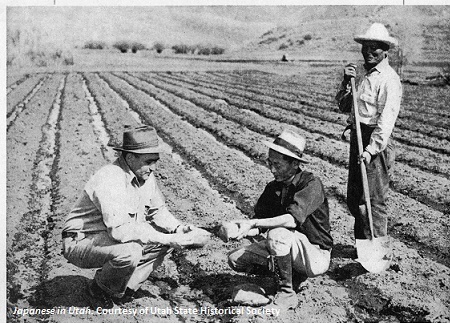Dublin Core
Title
Description
Keetley Farm was an agricultural settlement for Japanese Americans during World War II.
Many Utahns know the story of the internment camps built to imprison Japanese Americans during World War Two. Utah was even home to one such camp at Topaz in Millard County. But far fewer people know the story of Keetley Farms, an agricultural colony of "voluntarily" relocated Japanese Americans established halfway between Park City and Heber City.
Shortly after the bombing of Pearl Harbor by the Japanese Navy, President Franklin Roosevelt signed Executive Order 9066, authorizing the removal of more than 100,000 people of Japanese ancestry, some of whom were US citizens, from the West Coast. Some of these people moved voluntarily so as to avoid forced removal by the military. One such person, Fred Isamu Wada, settled on Utah as his new home, and struck a bargain with the mayor of the small town of Keetley to bring other relocated Japanese to the area as farm laborers. Wada and his colleagues founded their venture at Keetley as a cooperative, nonprofit enterprise to grow food for the American war effort.
Not everyone, however, was pleased with the agreement, and anti-Japanese sentiment around Keetley initially was strong, though over time relations between members of the colony and outsiders improved. When the war ended, about a third of the Japanese American farmers stayed in Utah. Their settlement, though, no longer exists. It now lies at the bottom of Jordanelle Reservoir.
Creator
Source
Image: Japanese in Utah. In the strawberry patch, Fred Wada, founder of the colony, talks things over with the superintendent of a neighboring mine. Courtesy of Utah State Historical Society.
_______________
See the June 1995 collection of the History Blazer, a joint project of the Utah State Historical Society and the Utah State Centennial Commission. The History Blazer can be found on the Utah History Suite CD available from the Utah State Historical Society.

